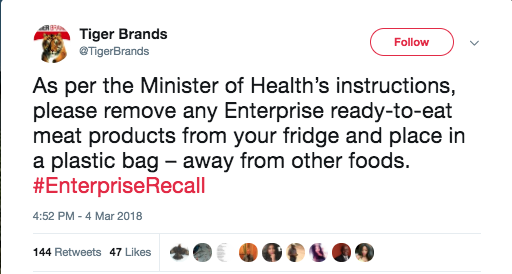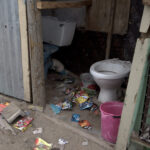The health department will tell you what you should be binning and how to do it safely without causing another public health nightmare.
On Monday, the health department will inform the public about which specific processed meats to throw away and how to discard them safely without creating another health hazard.
This comes after Health Minister Aaron Motsoaledi announced Enterprise Foods polony from the company’s Polokwane factory as the source of South Africa’s listeria outbreak on Sunday. The National Institute for Communicable Diseases (NICD) concluded tests that confirmed the link by midnight on Saturday.
Meanwhile, shops selling polony and other processed meat products should clean their fridges with diluted bleach, said Juno Thomas, head of the Centre for Enteric Diseases at the NICD, which studies viruses and bacteria that affect the gut.
Although polony is a definite culprit, there is a risk of cross contamination. “So viennas and other prepared meats must be avoided, even from companies that are not being recalled,” Motsoaledi cautioned.
Polony products at a Free State Rainbow Chicken Limited Foods (RCL Foods) facility have also been linked to the listeria bacterium. But more tests are needed to confirm whether the strain of the bacteria found at the chicken producer’s plant is the same as the outbreak strain, known as ST6, which has been responsible for the bulk of listeriosis cases. Similar tests are also being conducted at a Germiston Enterprise Foods factory after tests found listeria in several of its ready-to-eat meat products.
The health department has sent letters to Enterprise Foods’ Polokwane factor and RCL Foods’ Free State plant ordering them to recall their products. These companies have also been banned from exporting processed meat. The National Consumer Commission will oversee the recall.

Listeriosis is caused by eating food contaminated with a relatively common germ called Listeria monocytogenes. South Africa has confirmed 948 cases of the disease and 180 deaths as of 2 March, Motsoaledi said.
The listeria bacterium can cause blood poisoning or bacterial meningitis, a potentially deadly inflammation of the tissue surrounding the brain and spinal cord, particularly in people with weak immune systems, explains the United States nonprofit organisation, the Mayo Clinic.
While most people who eat contaminated food will not fall ill, NICD’s head of outbreak response Kerrigan McCarthy has urged those with compromised immune systems who think they have eaten contaminated products to consult a doctor.
The NICD has been hunting down the killer bacteria for almost six months. But last week, they were informed of a string of cases that finally helped them crack the case.
In January, nine children, all from the same crèche, were admitted to Chris Hani Baragwanath Hospital in Soweto with gastroenteritis. The children were all younger than five years old. The paediatrician on duty suspected listeriosis and alerted the NICD. That same day, environmental health practitioners visited the crèche, collected samples from two polony brands — Enterprise and RCL — and sent them to the NICD’s labs. At the NICD, Thomas and her team worked to match the samples to the strain of listeria that has caused 90% of the confirmed cases.
Once the NICD verified that the polony contained strains of the deadly bacteria, a team of environmental health practitioners, accompanied by technical advisors from the World Health Organisation, visited Enterprise Foods’ Polokwane plant to collect samples. The specimens were taken to the NICD labs where Thomas and her team ran tests to establish that the food that made the Soweto children sick came from the Polokwane facility.
Listeriosis was isolated from more than 30% of the food samples collected at the Enterprise’s Polokwane factory, Motsoaledi said. At midnight, on Saturday, the link was confirmed: “We can now conclude scientifically that the source of the present outbreak is the food from the Enterprise facility in Polokwane.”
- Scientists at the National Institute for Communicable Diseases worked around the clock to track down the source of the outbreak. Read how they did it here.
The department of agriculture, forestry and fisheries has suspended the exporting licenses of both Enterprise Foods and RCL Foods until further notice. RCL Foods’ licence has been suspended as a precautionary measure since the NICD has not yet found the outbreak strain of listeria in its foods. Emergency operations manager at the NICD Nevashan Govender explained: “A different strain — which has also been found in sick patients — was identified at Rainbow foods.”
In a press release, Enterprise Foods admitted it was “extremely concerned by listeriosis”. Spokesperson Naivashni Naicker confirmed to the Mail & Guardian that it has shut down its plants in both Polokwane and Germiston. The company is conducting its own tests to verify the presence of the outbreak strain at its plants and and expects results Monday.
RCL Foods released a statement on Sunday night in which it said the situation was being “treated as a crisis internally, and a senior team is in contact with all relevant stakeholders to discuss the significant impacts of this issue”.
“RCL Foods can confirm that its Wolwehoek processing plant has taken the pre-cautionary measures to suspend all production of RCL Foods’ Rainbow polony brand. Additionally, it is in the process of recalling all Rainbow polony products from its entire customer base,” the company said. “This is despite the fact that the results from testing of its polony product is still pending.”
Motsoaledi announced the government would incinerate food collected from Enterprise Foods factory in Polokwane and RCL Foods’ plant in Wolwehoek.
The World Health Organisation’s country representative, Rufaro Chatora, said his organisation recommended to the health department that production at the Polokwane plant be stopped entirely. “There was evidence of huge listeria prevalence, which was confirmed by the NICD,” he said.
The department of trade and industry has admitted that monitoring standards at factories have dropped. “It is now up to these companies to set up a recall strategy, and how they will pay for it,” said the department’s director general, Lionel October.
Food safety checks — which must be conducted by environmental health practitioners — are not prioritised by cash-strapped municipalities, Motsoaledi warned. “With all the problems facing municipalities, they often do not want to spend their resources to hire an environmental health practitioner.”
The health minister said the recall of the products did not mean people should stop adhering to food safety guidelines, like washing their hands regularly.
Motsoaledi said he had already emptied his fridge on Sunday morning. “It was full of polony. I encourage all South Africans to do the same.”









